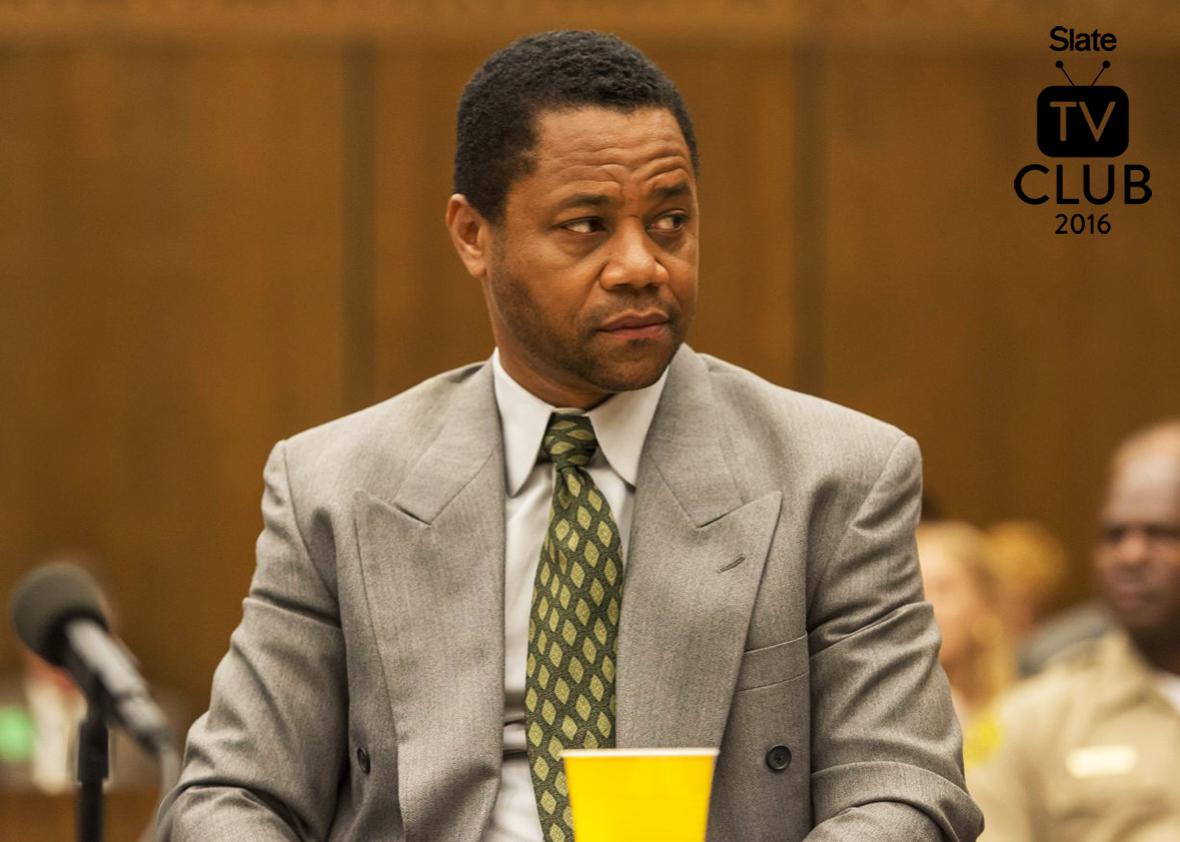Hey TV Club,
Admittedly, it is a little ridiculous that out of all the television shows I put on pause this year, Last Man Standing remains one of the few that I make sure to watch every week. It’s hard to explain why I do this considering it’s a sitcom about a world that is opposite to mine, with a protagonist that I am almost always in disagreement with, and it’s a show that angers me far more than it entertains me. Yet I can’t seem to turn it off (nor can I stop recapping every episode to poor friends who keep confusing it with Last Man on Earth). But perhaps it speaks to your point, Willa, about television bubbles.
I have my own bubble, both in real life and all over social media, of like-minded liberal friends and family, people who need no convincing of whatever I’m yelling about that week. For me, Last Man Standing (and yes, shows like The Ranch and CBS’s lineup, which I’m also a little too familiar with) is definitely a step outside, a glimpse into this ultra-white and enthusiastically conservative world. It’s not a world I necessarily want to visit, but it’s a world that I feel like I should keep tabs on. And I agree that, to its credit, the show does often take on debates that aren’t really being explored elsewhere even if I find its side of the debate frustrating. (Although, Todd, both Black-ish and Survivor’s Remorse have had great, recentish episodes about spanking!)
In fact, Last Man Standing is a prime example of how television has turned into another bubble. It’s a series that I joke is stealthily critic-proof; there are many episodes that are rife with upsetting, borderline-offensive dialogue that seems to be created by some writer playing Mad Libs with Twitter buzzwords—the “Precious Snowflake” episode about microaggressions and safe spaces is the best example this season. Normally this would provide fuel for critical think pieces, but no one seems to be watching! Of course, there are millions of people watching, but you know what I mean: Inside our bubble of unique, diverse, progressive television, Last Man Standing has escaped internet wrath simply by being so far outside of our interests that it never seems worth getting into—and that’s fine, too. Plus, I understand the show’s popularity: I imagine the way I feel watching my viewpoint reflected back to me on The Carmichael Show is how millions of Americans feel watching theirs on Last Man Standing.
But anyway, to both of your questions on what television should be doing and whether shows set in the past are engaging with our current reality: The People v. O.J. Simpson is probably the best series that could’ve emerged from 2016. It managed to be politically charged, angering, and funny at times (and not just when David Schwimmer said “Juice!”). It brought up issues of race and gender during a year when race and gender continue to divide us—but it also threw in some necessary silliness (and some obsessive Clark/Darden shipping) to keep the balance. While ESPN’s O.J.: Made in America was a similar tour de force of in-depth investigation and storytelling (and a must-watch), it was a series that I had to keep at arm’s length; the second part, which put Simpson in context of the tensions between black people and police officers and which showed videos of Rodney King and Latasha Harlins, sent me into a spiraling panic attack during a public screening by reminding me how cyclical and never-ending this violence is. I put off watching the rest of it for weeks.
But with The People v. O.J. Simpson, I watched every episode at least three times—some even more and not just for recapping purposes. I loved it, and I loved writing about it, talking about it, reading Jeffrey Toobin’s book (and even Simpson’s If I Did It, which, yikes), and archived newspaper articles. It’s a show with an ending we already know, but I was still so enthralled that I came this close to building a crazy wall to connect the dots. Aside from the general quality of the season, People v. O.J. also fed perfectly into my own intensifying true-crime obsession. For some reason, in 2016, my television interests oscillated wildly between silly comedies and terrible true-crime re-enactment shows. For at least three months straight, Investigation Discovery was the only channel that stayed on my bedroom television (I prefer most murderous shows to be watched first thing in the morning or last thing at night), and I even ended up at ID’s strange little true-crime con in Manhattan. I found myself gravitating toward these stories and toward bleak crime- and legalcentric shows (and books, and podcasts) like The Night Of or binge-watching literally every episode of Law & Order: SVU because I find that dark times make me want to seek out, well, darker times.
There were definitely moments when I needed comedy—Lady Dynamite, Unbreakable Kimmy Schmidt, and High Maintenance are all on my favorite shows of the year list—but for the most part, I wanted to drown myself in the opposite. And I don’t think I’m the only one; there are plenty of comedies that are dark as hell right now (You’re The Worst, BoJack Horseman, and Orange Is the New Black, which is either a comedy or a drama depending on the day of the week).
Where do you all gravitate when world around you gets rough: Do you seek out humor or do you lean into darkness?
Pilot
